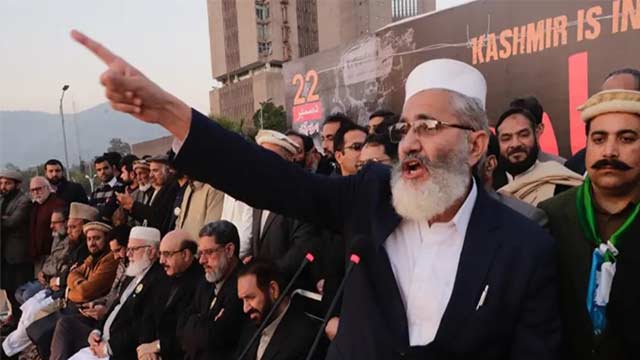ISLAMABAD , JUN 29 (DNA) — Former Ameer of Jamaat-e-Islami Pakistan, ex-Senator, and former Senior Provincial Minister Siraj ul Haq has said that the Afghan nation has proven its resilience by defeating British imperialism in 1919, Soviet imperialism in 1979, and NATO forces led by the U.S. in 2001, asserting that this region cannot be subjugated.
He emphasized that mistrust between Pakistan and Afghanistan must end, and both countries should become partners in development, trade, education, and health. He made these remarks as the chief guest at a seminar titled “New Dimensions of Pak-Afghan Relations” organized by the Institute of Regional Studies (IRS) Peshawar.
Siraj ul Haq proposed the revival and extension of the Peshawar-Torkham railway line into Afghanistan, issuance of special identity cards for Afghans, and permission for documented citizens of both countries to move freely across borders. He further stated that Pakistan and Afghanistan are two independent and sovereign neighboring nations deeply linked through religion, culture, language, and geography.
Strengthening their friendship is not only in their mutual interest but also crucial for regional development. He added that history bears witness to Pakistan’s consistent support for Afghans in difficult times, and stability in Afghanistan equally benefits Pakistan.
Siraj ul Haq asserted that the Pak-Afghan border is a recognized reality and any attempts to create controversy around it should not be supported. He termed the concept of “Pashtunistan” a dead issue and warned that any attempt to revive it would fail. He also claimed that Afghans defeated American imperialism, Pakistan countered the vision of a united India, and Iran resisted the idea of Greater Israel—together asserting genuine leadership of the Islamic world.
He proposed that Afghanistan, Pakistan, Iran, and Turkey should form a united front to lead the Muslim world and reshape the future of the region. Afghan Consul General Hafiz Mohibullah, in his address, highlighted that the first bond between Afghanistan and Pakistan is their shared Islamic faith.
He expressed gratitude to the Pakistani people for their sacrifices and lamented that the U.S., during its 20-year occupation, did not build hospitals or improve Afghanistan’s education and health sectors. He emphasized that, alongside government efforts, political leaders, scholars, traders, intellectuals, journalists, athletes, poets, writers, and artists from both countries must play a role in enhancing mutual understanding through direct engagement.
Deputy Chairman of the Pak-Afghan Joint Chamber of Commerce, Zia ul Haq Sarhadi, said bilateral trade, once at $2.5 billion, had plunged to $800 million due to recent tensions but is now gradually recovering. He urged improvements in transit trade, visa policy, and border management to ease difficulties faced by traders and transporters.
Senior journalist and analyst Mehmood Jan Babar and IRS Chairman Dr. Muhammad Iqbal Khalil agreed that both countries must not only strengthen diplomatic ties but also collaborate in education, healthcare, and cultural exchange to ensure lasting peace and development in the region. — DNA

















